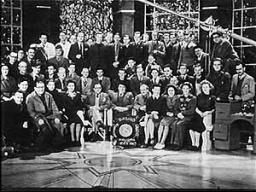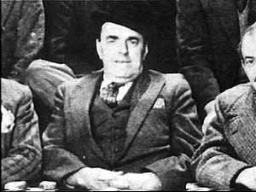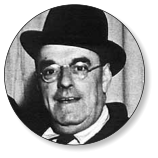

John E. Blakeley is the man responsible for the start of the film career of George Formby as
well has many other famous northern variety artists. Although Formby’s first two films were
produced in London studios, Blakeley is remembered mainly for the film studio he build in
Manchester.
He was born in 1889 and was from a family of cinema owners and film renters in the North
West. Together with other film and theatre owners, he formed a company called Mancunian
Films.
Around 25 films were produced over the next 20 years and were
distributed through a company called Butchers Films.
Initially he travelled to London to produce his films,
renting studios like Riverside at Hammersmith, George
Formby’s first films are known to have been filmed at
Albany Studios
By the end of the Second World War John E.
Blakeley’s slapstick comedies were extremely popular
in the North of England. Mancunian Films had taken
some of the most popular music hall acts from the
north and turned them into stars. These acts included
Formby, Frank Randle, Dan Young, Norman Evans,
Duggie Wakefield and many more. After 1945 there was a
boom in film production and the cost of studio time in London
increased dramatically
John E. Blakeley along with his sons and colleagues decided it was time to take film
production home to Manchester.
An old Weslyan Church on Dickenson Road, Rusholme was bought, converted and equipped
for £70,000. This became Film Studios (Manchester), the first feature film studio outside
London in the post war years. On the 12th May 1947 the studio was formally opened amid a
sprinkling of stars and excitement from local residents. The ceremony was attended by
George Formby, Dan Young, Frank Randle, Norman Evans and Sandy Powell and George
Formby and Sandy Powell made speeches wishing the studios well for the future.
Film Studios (Manchester) wasted no time and started work straight away producing a whole
string of low budget ‘B’ movies. The surrounding areas of Dickenson and Wilmslow Road was
used as a backdrop to many a Mancunian film, as were the local people in crowd or street
scenes. Local residents often lent their possessions to the props department who came to beg
and borrow to fill up the set.
Cup Tie Honeymoon was the first film to be made at the studio, starring Sandy Powell, Dan
Young, Betty Jumel and Pat Pilkington (later Pat Phoenix, Coronation Street’s Elsie Tanner).
The film, based around the theme of football with scenes shot at Manchester City’s Maine
Road stadium, was released to coincide with the beginning of the 1948 football season.
The International Circus Revue was the next release in 1948. This film featured a local circus
troupe from Manchester’s Belle Vue amusements and starred Sonny Burke and Bernard
Youens (later Coronation Street’s Stan Ogden).
The International Circus Revue was made using footage from a documentary shot by
Mancunian called The Showground of the North, released in 1949. The Showground of the
North was a travelogue of Belle Vue’s Zoological Gardens, circus and amusments. This was
John E. Blakeley’s only departure from comedy during his career.
During the early 1950’s Tom Blakeley was producer for Mancunian Films. He worked with
outside directors on productions such as Never Look Back and Love’s a Luxury (1952), Those
People Next Door and Lonely Weekend (1953).
It’s A Grand Life (1953) was John E. Blakeley’s 22nd and final feature film at the age of 64 and
also Frank Randle’s last film before he died of consumption in 1955. This movie brought
together Frank with the 22 year old blonde bombshell, Diana Dors, who was already in her
14th film. The title of this film must surely reflect the quality of the life which John E. Blakeley
shared with the workers and stars of Manchester ’s little Hollywood.
By the mid 50’s the cost of
film production had
increased whilst the
advent of television
caused cinema audiences
to decline. In 1954 Film
Studios (Manchester) was
sold to the BBC and the
church became the first
studio to broadcast
outside London in the
fifties (Pictured left).
Eventually the studio was
demolished in 1967
Bringing laughter to war-ravaged Britain




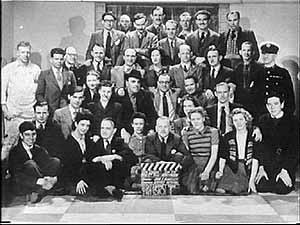

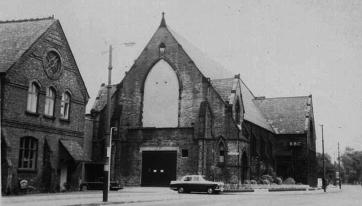




John E. Blakeley is the man responsible for the start of
the
film career of George Formby as well has many other
famous northern variety artists. Although Formby’s
first two films were produced in London studios,
Blakeley is remembered mainly for the film studio he
build in Manchester.
He was born in 1889 and was from a family of
cinema owners and film renters in the North West.
Together with other film and theatre owners, he formed a
company called Mancunian
Films. Around 25 films were
produced over the next 20
years and were distributed
through a company called
Butchers Films.
Initially he travelled to London
to produce his films, renting
studios like Riverside at
Hammersmith, George
Formby’s first films are known
to have been filmed at Albany
Studios
By the end of the Second
World War John E. Blakeley’s
slapstick comedies were
extremely popular in the North
of England. Mancunian Films
had taken some of the most
popular music hall acts from
the north and turned them into
stars. These acts included
Formby, Frank Randle, Dan
Young, Norman Evans,
Duggie Wakefield and many
more. After 1945 there was a
boom in film production and
the cost of studio time in
London increased dramatically
John E. Blakeley along with
his sons and colleagues
decided it was time to take film
production home to
Manchester.
An old Weslyan Church on
Dickenson Road, Rusholme
was bought, converted and
equipped for £70,000. This
became Film Studios
(Manchester), the first feature
film studio outside London in
the post war years. On the
12th May 1947 the studio was
formally opened amid a
sprinkling of stars and
excitement from local
residents. The ceremony was
attended by George Formby,
Dan Young, Frank Randle,
Norman Evans and Sandy
Powell and George Formby
and Sandy Powell made
speeches wishing the studios
well for the future.
Film Studios (Manchester)
wasted no time and started
work straight away producing
a whole string of low budget
‘B’ movies. The surrounding
areas of Dickenson and
Wilmslow Road was used as a
backdrop to many a
Mancunian film, as were the
local people in crowd or street
scenes. Local residents often
lent their possessions to the
props department who came
to beg and borrow to fill up the
set.
Cup Tie Honeymoon was the first film to be made at the studio, starring Sandy
Powell, Dan Young, Betty Jumel and Pat Pilkington (later Pat Phoenix,
Coronation Street’s Elsie Tanner). The film, based around the theme of football
with scenes shot at Manchester City’s Maine Road stadium, was released to
coincide with the beginning of the 1948 football season.
The International Circus Revue was the next release in 1948. This film featured
a local circus troupe from Manchester’s Belle Vue amusements and starred
Sonny Burke and Bernard Youens (later Coronation Street’s Stan Ogden).
The International Circus Revue was made using footage from a documentary
shot by Mancunian called The Showground of the North, released in 1949. The
Showground of the North was a travelogue of Belle Vue’s Zoological Gardens,
circus and amusments. This was John E. Blakeley’s only departure from
comedy during his career.
During the early 1950’s Tom Blakeley was producer for Mancunian Films. He
worked with outside directors on productions such as Never Look Back and
Love’s a Luxury (1952), Those People Next Door and Lonely Weekend (1953).
It’s A Grand Life (1953) was John E. Blakeley’s 22nd and final feature film at
the age of 64 and also Frank Randle’s last film before he died of consumption
in 1955. This movie brought together Frank with the 22 year old blonde
bombshell, Diana Dors, who was already in her 14th film. The title of this film
must surely reflect the quality of the life which John E. Blakeley shared with the
workers and stars of Manchester ’s little Hollywood.
By the mid 50’s the cost of film production had increased whilst the advent of
television caused cinema audiences to decline. In 1954 Film Studios
(Manchester) was sold to the BBC and the church became the first studio to
broadcast outside London in the fifties (Pictured below). Eventually the studio
was demolished in 1967
Bringing laughter to war-ravaged Britain
